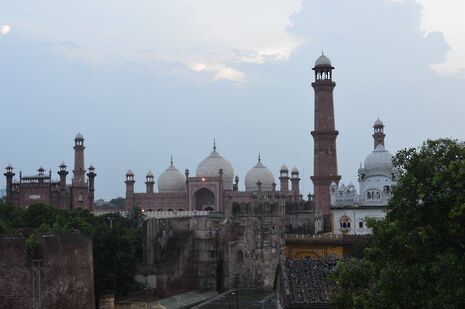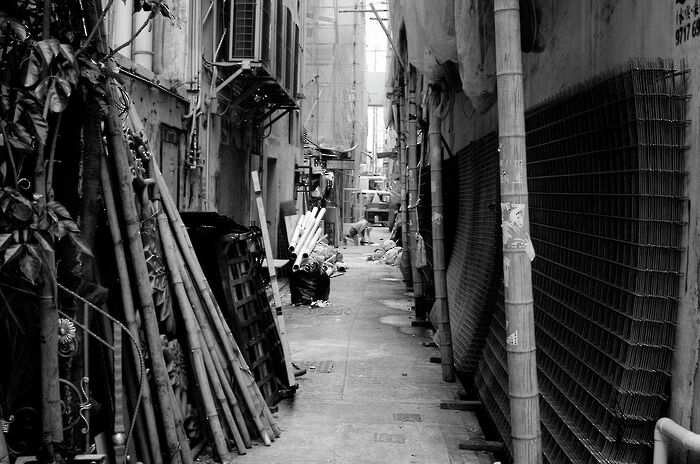A coat-switcher from Pakistan
In coming to Cambridge, Khadija Tahir finds herself emboldened to embrace her Pakistani identity.

The first time I ever heard the term ‘coat switching’ was at a freshers’ event in Cambridge, when I finally ran into a Pakistani student amid the many British people at a pizza night. After greeting each other with enthusiasm, and talking with animated hand gestures about missing biryanis and salans from Lahore, I was told by a guy observing us that I was ‘changing’ myself to fit in – moving from British to Pakistani.
He said my accent had shifted: I was pronouncing my ‘R’s and hardening the ‘T’s. My accent, my mannerisms, and the frequent shifts in my behaviour, which I was partly aware of, were things that I’d always credited to my education at an ‘international school’. The irony of this was that there were actually no international people at my school: it had become a term for schools that had students who spoke fluent English, with an American or British accent.
Cambridge had empowered me as a Pakistani, and this institution, which once propagated colonialist ideals, was now the medium through which I became proud of my ex-colonial nation.
My ‘coat switching’ wasn’t at all just a mixture of the cultures and accents that I’d picked up from people around me. It was the social education that I’d received, telling me to act like the West so that I could be part of the West, and eventually have the West become part of my identity. I hardly noticed the changes in my tone and pitch and the shift in my pronunciation when I switched between speaking to a British person and a Pakistani person. I had become so used to being a mirror of the westerner in front of me that it had become almost second nature.
The boy from Homerton College who pointed out my ‘pretentions’ made me realise that the power dynamics of colonialism – which I was sure had ended in 1947, with the birth of a nation I am now proud to be a citizen of – implicitly remained in the post-colonial generations. So my ‘coat switching’ was this subconscious abandonment of the disciplines I had been taught to uphold for the sake of being ‘accepted’ into Western society. In the company of another Pakistani, I abandoned what had been the only accent I'd ever spoken in and instead brought out the animations that I'd been told would make British people uncomfortable. I coat-switched and adjusted because I had always seen myself, and my country, as secondary to the West.
That night, going back to my room after dinner, I kept wondering why I’d felt like I had to change the way I acted depending on the ethnicity of the person I was speaking to, and why I was feeling so guilty about it. Was it a betrayal of my Pakistani heritage and also my third-generation post-colonial identity? This sense of guilt tied in perfectly with the apologetic attitude I was expected to sustain. From apologising for the religious extremism that terrorist groups killed my own people with, to apologising about the ‘exotic scents’ of the food I rarely cook in kitchens – it was all a quest to make others feel more comfortable around me, and make me no different from them.
And I had always gone along with this, mostly not noticing that it was something I was doing to begin with, but also because I thought it was justifiable. The political instability of my country, the illiteracy rate, the poor sanitation and the plethora of other problems plaguing Pakistan somehow discounted the rich culture, the incredible history, the generosity of the people, the beauty of the mountains up north, the diversity of languages and everything else I’d recite to prove to people that it wasn’t just the country they were warned about on British and American television.
‘Coat switching’ wasn’t at all just a mixture of the cultures and accents that I'd picked up... It was the social education that I'd received, telling me to act like the West so that I could be part of the West
I even shortened my name to succumb to the standards that British colonialism has instilled within my people. Khadija, a name so common in the Muslim world, a world consisting of around 1.8 billion people, became a tongue twister. People in clubs would look at me like I’d dictated a mathematical equation to them instead of my 3-syllable name. I’d then resort to pronouncing it slowly, as though I was explaining a simple instruction to a 5-year-old, and, for some reason, I’d always be the one feeling embarrassed.
I was ashamed of my name being too complex for many of the Cambridge undergraduates to grasp. And if they managed to get past pronouncing it correctly, they’d always nonchalantly add, “Well, there is no way I’m remembering that”, as if it were a feat I couldn't expect them to overcome. It was my duty to make my name more convenient, not because they had expected it from me, but because I had put myself in this position. They had only ever seen us apologising for being Pakistani, and no one knew any different. We were sorry for our country. We were sorry for our names.
It was unfair of me to expect people to automatically understand my culture, language and religion, but then why was I so well-versed in theirs? Why was I aware of what a full English breakfast was, or of the political relations between the Conservatives and the Labour party? I just hadn't known any different. Colonialism, on various levels, played a significant role in my life. My grandfather was educated in Colonial India and migrated during partition to Pakistan. He fought in the Second World War with the British army and, in order to progress, accepted the fact that adopting their way of living was essential. He wore suits, read and spoke English, and ate with a fork and knife, rather than with his hands as was typical of Pakistani people.
This isn’t to say that he accepted his country’s inferior position to the British, but he acknowledged that, even after partition, the impact left on Pakistan would hardly disappear. He was right. The value placed on all things Western was significant, and, honestly, it was why I was sent to Cambridge in the first place. The ‘typically British’ traditions and constant interaction with people I should learn from were driving forces behind my parents’ encouragement for me to apply here. They thought I’d come to appreciate classical music, eloquently written Eurocentric literature, and Renaissance art, alongside getting my degree. That isn’t quite what happened.
The ‘typically British’ traditions... were driving forces behind my parents’ encouragement for me to apply here.
I’ve learnt a lot from Cambridge so far, and some of it did coincide with my family’s expectations, but the most important thing I learnt was a simple slang term: 'coat switching'. After a quick search on Urban Dictionary, it was that boy from Homerton, and this phrase, that completely changed my perspective.
I became aware of how I was responding to the people around me with a sense of embarrassment of where I came from and where I had grown up. Armed with this new awareness, it became easier to appreciate and understand the vitality of people like me, people who had different experiences and different backgrounds from the mainstream dialogue. The conversations became more interesting when I started to relate other people’s anecdotes to my own life back home. I stopped shortening my name to ‘Deej’ or ‘DJ’, and noticed that it really wasn’t as frequently mispronounced as I thought it would be.
Cambridge had empowered me as a Pakistani, and this institution, which once propagated colonialist ideals, was now the medium through which I became proud of my ex-colonial nation. It was up to me to change the aforementioned power dynamics, and I could only do that by accepting that I was not secondary to any particular race or ethnicity. The right possessed by my country, the right to be heard as a sovereign nation on a global platform, was a right I had to allow myself as well.
Soon enough, after this change in mindset, I found that people valued my viewpoints. I was contributing to their discussions. I held Imran Khan and his politics on an equal pedestal to the British politics that were discussed so frequently. I appreciated Saadat Hasan Manto’s stories as much as I did those of any British writers. I cannot undo colonialism, or even eliminate the British influence, and maybe that point will never come, but this self-awareness has encouraged me to make an active effort to not forget about my country and its incredible presence.
Decolonizing my life began with changing my own mindset, and it is an ongoing process, one that I might carry out my whole life. It's about appreciating the glimpses of my culture that I see in myself everyday, from listening to Pakistani music while biking past King's College Chapel, to just talking to my parents and friends in Urdu as I walk through The Backs. I cannot deny my roots, and now I don’t feel the need to either.
 News / SU reluctantly registers controversial women’s soc18 December 2025
News / SU reluctantly registers controversial women’s soc18 December 2025 Features / Should I stay or should I go? Cambridge students and alumni reflect on how their memories stay with them15 December 2025
Features / Should I stay or should I go? Cambridge students and alumni reflect on how their memories stay with them15 December 2025 News / Dons warn PM about Vet School closure16 December 2025
News / Dons warn PM about Vet School closure16 December 2025 News / Cambridge study finds students learn better with notes than AI13 December 2025
News / Cambridge study finds students learn better with notes than AI13 December 2025 News / Uni registers controversial new women’s society28 November 2025
News / Uni registers controversial new women’s society28 November 2025









